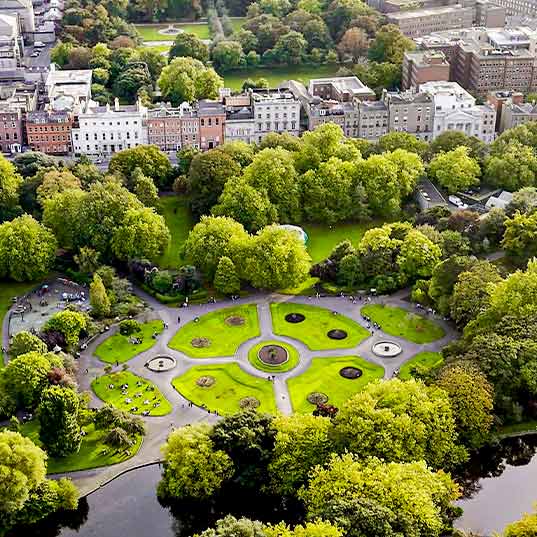The cities most committed to the environment
Discover in this gallery what cities of the world are leaders in sustainable development
Sustainable cities ranking
The fast growth of cities, where over half the world’s population live, has created a raft of common problems such as congestion, poor housing, shortage of funds for basic services, insufficient communication and public transport infrastructure, etc.
Faced with these challenges, many cities are developing policies that promote sustainable development at the environmental, social and economic level, without going short through any of them. Not only do they embrace economic well-being indicators, but they also prioritize analysis and management of others like education, health, green spaces, pollution, transport, tourism and employment.
Based on three main criteria – people, environment and economy – the Arcadis consultancy, which specializes in environment, infrastructure and design, prepares an annual ranking of the cities most committed to sustainable development. Find out from this gallery which are the 10 top cities according to the most recent study in 2016.
10. Munich
The Bavarian capital is, with Berlin and Hamburg, one of the most important cultural and economic centers in Germany and is also a benchmark for energy transition. The local government has set itself the aim of 100% clean electricity generation by 2025. To achieve this, all the city’s businesses and industries are obliged to invest in renewable energies.
Another initiative, the Green City, advocates returning the city back to the people. With over 1,500 volunteers, it holds events throughout the year such as opening cyclist routes, tree planting, charity markets, street festivals, city education workshops for children, and so on. As for the economy, Munich is the third biggest financial center in Europe in terms of the number of investors it attracts, thanks to 22.5 million square meters of workspace.
9. Prague
The Czech capital and its area of influence is one of the richest regions in the EU, in enormous contrast to the rest of the country. The capital’s inhabitants enjoy per capita earnings over twice the national average.
Its citizens also dispose of the Green City Guide, a book available in conventional and digital formats, which lists all the sustainable activities taking place on a one-off or permanent basis. This can be cinema cycles with social themes, sustainable cookery and other educational courses, markets, city farms, and so on. It also lists all the ecologically-minded businesses in Prague, from bike hire firms to restaurants and fair traders.
8. Hamburg
Population growth in Hamburg, Europe’s Green Capital in 2011, has risen over recent decades to reach almost two million inhabitants. The great challenge for Germany’s second city was thus to optimize transport and city center infrastructure without increasing emissions, and it has achieved this well. Every citizen lives within 300 meters of a stop for public transport.
In addition, the HafenCity development project will transform 40% of the city’s surface area into parks, gardens, paths and green zones. This measure, as well as having environmental and aesthetic benefits, will serve to protect the city against possible floods from the Elba river, by acting as a natural sponge in a city known as the Venice of the North.
The same plan is converting 157 acres of Hamburg port, one of the biggest industrial estates on the European continent, into a space shared by denizens. In fact, over the past two years, homes for 12,000 people and offices for 45,000 workers have been built, with many of the buildings winning sustainable architecture awards.
Meanwhile, in terms of infrastructure, Hamburg City Hall has banned construction companies from using PVC (a plastic derivative considered by many to be toxic to people) in new buildings.
7. Seoul
Seoul is one of the planet’s biggest cities, with a metropolitan area of almost 26 million inhabitants and one of the biggest economies in the world. But, irrespective of its vertiginous growth, the South Korean capital has been quick to latch on to sustainable development.
Already possessing the third most extensive suburban train system in the world, its next aim is to convert its bus fleet into an electric one according to an ambitious timetable where half of its vehicles (120,000) will be electric in 2020.
Despite its large population, Seoul is the most popular with its residents, according to a sub-ranking. Why? Mainly due to launch of the 2030 Seoul Plan, under which the city is from this year onwards dedicating a sizeable part of its resources to five key objectives: ending discrimination, driving job creation, growing cultural and historical assets in the city, increasing safety on the streets, and improving communications and transport.
6. Frankfurt
In the last Arcadis report, the German city obtained the highest score. In the present study, it remained in the Top 10 thanks to measures such as the 2025 Frankfurt e-mobility program, which seeks to incentivize the use of sustainable transport modes such as bicycles and electric vehicles by means of an urban infrastructure development plan.
As for its people, Frankfurt has launched a plan in conjunction with Caritas, called Cariteam Energy Saving Service, through which unemployed people are trained in energy saving at home and receive a free pack of articles that will help them to reduce spending. The program is achieving savings of 350,000 tonnes of CO2 per year and represents an important economic aid for households with economic problems.
5. London
The United Kingdom capital, home to what many experts consider to be the most polluted street in the world, Oxford Street, has an ambitious plan to free the city center of carbon dioxide emissions.
To achieve this, it has launched 50 electric buses and will have replaced all its single-decker fleet with zero-emission vehicles by 2020, by when 3,000 of its iconic double-deckers will also be hybrid.
Despite Brexit (the United Kingdom’s process to exit the European Union), London is the third city in the ranking economically speaking, thanks to its legendary competitiveness, and the seat of many top companies in Europe and the world.
On the other hand, according to the sub-ranking, its residents evidently believe it can do better, given it occupies 37th place in the citizens’ satisfaction index. The population is forecast to reach 10 million in 2030, whereas 28% of residents currently live below the poverty level, revealing huge economic inequalities in the English capital.
4. Vienna
One of the most progressive European capitals in terms of sustainability, Vienna is currently busy rolling out its Smart City Wien project, which has aimed since 2011 at pursuing self-sufficiency in energy.
The Austrian capital is also planning to become more ecological, with more than 800 hectares earmarked for organic farming. It is also a leader in second-hand markets.
The Viennese live in a city with the best quality of life, according to consultants at Mercer, who have studied employment, wealth and health in towns and cities. Viennese have a high level of purchasing power and their services, infrastructure and cultural offerings are second to none.
3. Stockholm
The Swedish capital stands out for its commitment to the planet. It was Europe’s Green Capital in 2010, with its airport the first to be awarded Airport Carbon Accreditation. Stockholm also offers visitors an ecological tourist guide so they can enjoy a sustainable holiday.
As for mobility, Stockholm is home to nearly 800 kilometers of cycle lanes and has an extensive network of charging points to boost the take-up of electric vehicles.
Regarding the social aspect, the city launched a program, which it aims to complete in 2040, focusing on four main areas: citizen solidarity and integration, climate intelligence, sustainable economy and sustainable democracy.
2. Singapore
The capital of the country with the biggest population growth in the world is consequently, according to the Arcadis ranking, the second most committed city to sustainability, but population growth is not the only motive for this.
Singapore also has the third highest per capita income in the world and occupies first place in other key aspects of sustainable development, such as education and health. In a city that expects to reach six million inhabitants in 2030, the local government Is preparing for an avalanche of migrants who will want to live and work in Singapore over the coming years, by filling the city with hospitals, health centers, schools, shopping centers and other leisure facilities.
At the environmental level, Singapore calls itself The Garden City and not without reason. It plans to replace the surface area of green areas lost to architectural development with terraces, roof and vertical gardens, such that by 2030 at least 80% of buildings will be green.
1. Zürich
Of all the world’s cities, the most committed to sustainability is Zurich. The Swiss capital, as well as being the first in the environmental commitment ranking, leads the international 2000-Watt Society program, the objective of which for 2050 is for all developed countries to reduce their energy consumption so that developing nations can increase theirs. Consequently, every citizen will be able to make do with an average of 2,000 watts per year. The program’s vision began in Zurich at ETH, the Swiss Federal Institute of Technology, at the end of the 1990s, which considered that every inhabitant on the planet could easily carry out his or her daily routine by using no more than this amount of energy.
In addition, Zurich has renewed its public transport system to reduce polluting emissions, while continuing as one of the world’s most important economic centers.
At the economic level, innovative companies, small and large, make up the financial heart of the Swiss capital, where high productivity and low production costs make it one of the most competitive economies worldwide.
Sources: Arcadis, Arcadis II, Huffington Post, CDP (vídeo), CNBC, Pebble Mag, Foro Económico Mundial, Earth Zine, Blue and Green Tomorrow, Curbed, National Geographic, Green City, Colliers, Green City Guide, HafenCity, Hamburg Marketing, 2030 Seoul Plan, Frankfurt Green City, Vienna, Mercer, Visit Stockholm and National Geographic II.









